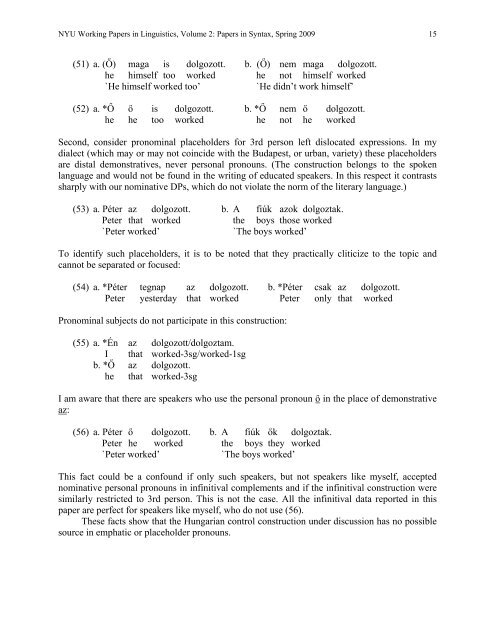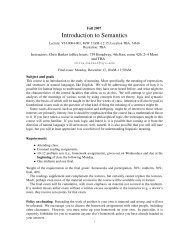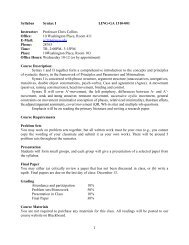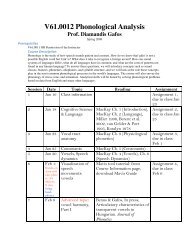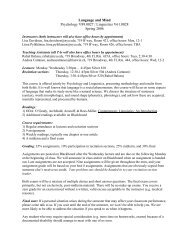Overt Nominative Subjects in Infinitival Complements Cross - NYU ...
Overt Nominative Subjects in Infinitival Complements Cross - NYU ...
Overt Nominative Subjects in Infinitival Complements Cross - NYU ...
You also want an ePaper? Increase the reach of your titles
YUMPU automatically turns print PDFs into web optimized ePapers that Google loves.
<strong>NYU</strong> Work<strong>in</strong>g Papers <strong>in</strong> L<strong>in</strong>guistics, Volume 2: Papers <strong>in</strong> Syntax, Spr<strong>in</strong>g 2009 15(51) a. (Ő) maga is dolgozott. b. (Ő) nem maga dolgozott.he himself too worked he not himself worked`He himself worked too’`He didn’t work himself’(52) a. *Ő ő is dolgozott. b. *Ő nem ő dolgozott.he he too worked he not he workedSecond, consider pronom<strong>in</strong>al placeholders for 3rd person left dislocated expressions. In mydialect (which may or may not co<strong>in</strong>cide with the Budapest, or urban, variety) these placeholdersare distal demonstratives, never personal pronouns. (The construction belongs to the spokenlanguage and would not be found <strong>in</strong> the writ<strong>in</strong>g of educated speakers. In this respect it contrastssharply with our nom<strong>in</strong>ative DPs, which do not violate the norm of the literary language.)(53) a. Péter az dolgozott. b. A fiúk azok dolgoztak.Peter that worked the boys those worked`Peter worked’`The boys worked’To identify such placeholders, it is to be noted that they practically cliticize to the topic andcannot be separated or focused:(54) a. *Péter tegnap az dolgozott. b. *Péter csak az dolgozott.Peter yesterday that worked Peter only that workedPronom<strong>in</strong>al subjects do not participate <strong>in</strong> this construction:(55) a. *Én az dolgozott/dolgoztam.I that worked-3sg/worked-1sgb. *Ő az dolgozott.he that worked-3sgI am aware that there are speakers who use the personal pronoun ő <strong>in</strong> the place of demonstrativeaz:(56) a. Péter ő dolgozott. b. A fiúk ők dolgoztak.Peter he worked the boys they worked`Peter worked’`The boys worked’This fact could be a confound if only such speakers, but not speakers like myself, acceptednom<strong>in</strong>ative personal pronouns <strong>in</strong> <strong>in</strong>f<strong>in</strong>itival complements and if the <strong>in</strong>f<strong>in</strong>itival construction weresimilarly restricted to 3rd person. This is not the case. All the <strong>in</strong>f<strong>in</strong>itival data reported <strong>in</strong> thispaper are perfect for speakers like myself, who do not use (56).These facts show that the Hungarian control construction under discussion has no possiblesource <strong>in</strong> emphatic or placeholder pronouns.


